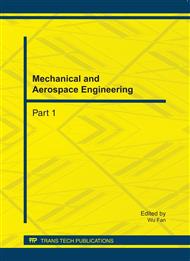[1]
A. Visioli: FL Based Set-Point Weight Tuning of PID Controllers. (IEEE Transactions on Systems Man and Cybernetics Part a-Systems and Humans, 1999 (29), pp.587-592).
DOI: 10.1109/3468.798062
Google Scholar
[2]
Z.W. Woo, et al: FL Controller with Self-tuning Scaling Factors. Fuzzy Sys, (115), 2000, p.321 – 326.
Google Scholar
[3]
A. Visioli: Tuning of PID Controllers with FL. IEE Control Theory and Application, (14), 2001, pp.1-8.
Google Scholar
[4]
R. Bandyopadhyay, et al: Autotuning a PID Controller: A Fuzzy-Genetic Approach. Journal of Systems Architecture, (47), 2001, pp.663-673.
DOI: 10.1016/s1383-7621(01)00022-4
Google Scholar
[5]
H. B. Kazemian: Developments of FL-PID controllers. Expert Systems: The Int. Journal of Knowledge Engineering and Neural Networks. (22), 2005, pp.254-264.
DOI: 10.1111/j.1468-0394.2005.00316.x
Google Scholar
[6]
Carvajal, et al: FL-PIDDesign, Performance, and Stability. Info Science, (123), 2000, pp.249-270.
Google Scholar
[7]
K. I. Georg, et al: Two-Level Tuning of FL-PID Controllers. (IEEE Trans. on System, Man, and Cybernetics, (31), 2001, pp.263-269).
DOI: 10.1109/3477.915351
Google Scholar
[8]
K. S. Tang, et al: An Optimal FL-PID Controller. (IEEE Transactions on Industrial Electronics, (48), 2001, p.757 – 765).
Google Scholar
[9]
J. Kennedy, R. Eberhart: Particle Swarm Optimization. (Proceedings of IEEE International Conference on Evolutionary Computation, 1995, pp.1942-1948).
Google Scholar
[10]
X. Cui, et al: A Swarm-based FL Control Mobile Sensor Network for Hazardous Contaminants Localization. (IEEE International Conf. on Mobile Ad-hoc and Sensor System, 2004).
DOI: 10.1109/mahss.2004.1392158
Google Scholar
[11]
S. Wahsh, et al: Tuning PI-Controller Using PSO for Control of Permanent Magnet Synchronous Motor. 5th st. Petersburg Workshop in Simulation, RUSSIA, 239-244, (2005).
Google Scholar
[12]
B. Allaoua, et al: The Efficiency of PSO Applied on Fuzzy Logic DC Motor Speed Control. Serbian Journal of Electrical Engineering, (5), 2008, pp.247-262.
DOI: 10.2298/sjee0802247a
Google Scholar
[13]
A. Elwer andS. Wahsh: Improved Performance of Permanent Magnet Synchronous Motor by Using PSO Techniques. Journal of Power Electronics, (9), 2009, pp.207-214.
DOI: 10.1109/chicc.2006.4347053
Google Scholar
[14]
Z. Bingul andO. Karahan: A FL Controller Tuned with PSO for a 2 DOF Robot Trajectory Control. Expert System Application, 2010, pp.1017-1031.
DOI: 10.1016/j.eswa.2010.07.131
Google Scholar
[15]
B. Boutler: Elevator modeling and DC drive speed controller design. ApIC S LLC, (2000).
Google Scholar


